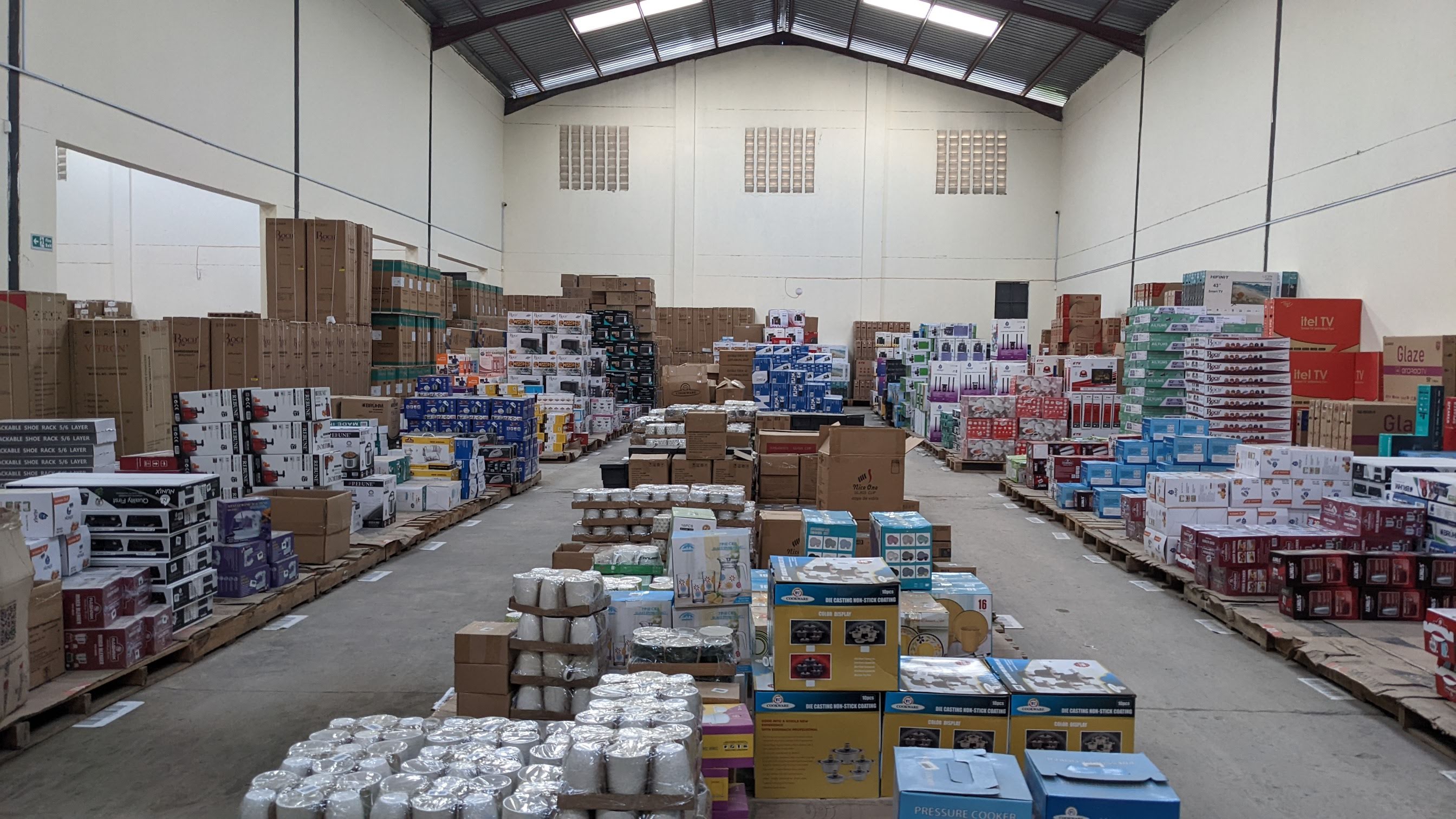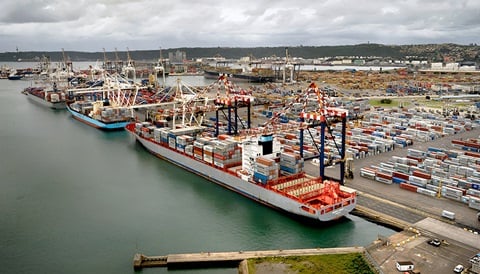Chinese budget chain shakes up Kenyan retail sector
Expanding Chinese-owned budget retail chains are a bonanza for African consumers but threat for local retailers and manufacturers

China Square, a Chinese-owned retail chain selling predominantly imported goods from China, is disrupting Kenya’s retail landscape with its low prices. While its aggressive pricing has drawn large crowds of budget-conscious shoppers it has also drawn backlash from local retailers who say they cannot compete.
Since launching in Kenya in 2023, China Square has rapidly expanded, recently opening its seventh store. Earlier this year it took up 10% of the lettable space at the Two Rivers Mall in Nairobi –the largest shopping centre in sub-Saharan Africa outside of South Africa. The retail outlet sells everything from kitchenware and furniture to electronics – often at prices that is drastically lower than local competitors. For example, an eyelash selling for KES 200 (US$1.54) in the local market can be picked up for KES 88 (US$0.68) at China Square. A plastic pedicure stool, which cost around US$43 in his shop, is sold at China Square for just US$21. Most of the inventory is imported from China, though the retailer reportedly stocks some products from Kenya, Turkey, and Egypt.
China Square opened its first Kenyan outlet in a mall on the outskirts of Nairobi in Feb 2023 and quickly drew opposition from local traders. A traders’ protest forced the retailer to shut down for week. Operations resumed only after discussions between the Kenyan government and representatives of the local Chinese business community.
Some Kenyan traders say they pay more for Chinese imports than China Square, which may secure lower prices through bulk purchases and direct manufacturer relationships. In contrast, smaller shopkeepers often rely on middlemen, increasing their costs.
Yet for many Kenyan consumers, these lower prices are a welcome relief amid rising living costs. When the chain opened in the coastal city of Mombasa last year, demand was so high that security guards had to control entry, and roads around the mall were gridlocked. Pillows and mattresses were among the items that quickly sold out.
China Square originally launched in South Africa in 2017 and has since expanded to Zambia, Côte d'Ivoire, Ghana, Mali, Senegal, Gabon, and Kenya. However, unlike in Kenya, there is little evidence of widespread resistance to its presence in these markets.
By contrast, in South Africa, concerns have centred on online Chinese retailers Shein and Temu, which have significantly disrupted the country’s retail sector with ultra-low pricing. To address concerns from local businesses, the South African government introduced tax reforms aimed at closing loopholes that previously benefited these platforms. Until recently, Shein and Temu could ship small orders to South African consumers at a flat 20% duty with no VAT for purchases under ZAR 500 (US$28), a policy initially designed for courier shipments. Meanwhile, local retailers importing in bulk faced a 45% tariff and a 15% VAT. After lobbying from industry groups, authorities adjusted the tax structure in July 2024 bringing the tax structure that previously favoured the likes of Shein and Temu with one that applies to domestic retailers.
 Kilimall in Kenya.
Kilimall in Kenya.
Affordable Chinese consumer products have become widely available in Africa. Their arrival has been something of a mixed blessing. While access to these products allow African consumers to beat inflation and purchase goods that might otherwise be out of reach, thereby improving their quality of life, its influx has also made it difficult for domestic industry to compete. Moreover, Chinese-made products in Africa are said to be sub-standard, leading to concerns about durability and safety. A study by the African Development Bank (AFDB) estimated that African manufacturing industries could be losing up to US$50 billion annually due to competition from low-cost imports. But this does not reveal the entire story of the retail trade between China and Africa. Platforms such as Kilimall, Alibaba Group’s Tmall, JD.com, and Kikuu are providing a virtual doorway for African suppliers into the world’s largest e-commerce market. Kilimall, for instance, is an e-commerce platform started in Kenya that provides e-commerce transaction, mobile payment, and cross-border logistics services for over 10 million African users. Through live-streaming events on these e-commerce platforms during shopping festivals in China, sales of African goods pick up. During one such festival in China in May 2022, the sales of Kenyan black tea and Ethiopian coffee surged 409% and 143% compared to 2021 figures.
China has been Africa’s largest trading partner for over 15 years. In 2024, bilateral trade reached US$295bn, with Chinese exports to Africa totalling US$178bn and imports from Africa at US$116bn. However, the relationship remains unbalanced. Primary commodities — metals, mineral products and fuel — represent about three fifths of Africa’s exports to China, while it typically imports Chinese manufactured goods, electronics and machinery. To address these imbalances, African countries are trying to make a concerted effort to diversify their exports to China. Important steps include the slow, but steady, implementation of the AfCFTA to create regional value chains, utilizing trade preference programs particularly the green lanes initiative that China launched opening its market to African agriculture exports. After years of investments in trying to meet stringent sanitary and phytosanitary standards imposed by China, Kenyan farmers has begun exporting flash-frozen avocados to China. 30% of Kenyan-grown avocados are now exported to China. Namibia has followed suit and Ethiopian and Rwandan coffee is now being sold in China via e-commerce platforms. Such developments have not yet shown up in significant ways in aggregate Africa-China trade data but constitute a slow change in the pattern of agricultural exports out of Africa.
References
'Popular Chinese-owned store in Kenya shuts doors after rival traders complain about prices', South China Morning Post, 27 February 2023
‘China Square resumes operations after standoff with CS Moses Kuria’, Citizen Digital, 06 March 2023
'China Square: The cheap Chinese shop at the centre of Kenya row', BBC, 06 March 2023
‘Shein, Temu and others: SA has now lost R3.5 billion in tax, says Kieswetter’, News24, 17 July 2024
‘Temu and Shein tax changes tested — with strange results’, MyBroadband, 23 July 2024
'Soft life: Women scramble for pillows as China Square opens doors in Coast', The Standard, 23 Aug 2024
'China Square opens Two Rivers Mall outlet in expansion drive', Business Daily, 10 January 2025
'China Square's Sh1b expansion war chest rattles retail outlets', The Standard, 13 January 2025
'The persistent China-Africa trade imbalance — Is it China’s fault?', China Global South Project, 24 January 2025
'Fair and Square? Chinese retail chain’s expansion rankles Kenyan rivals', The Guardian, 12 February 2025







